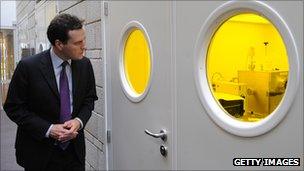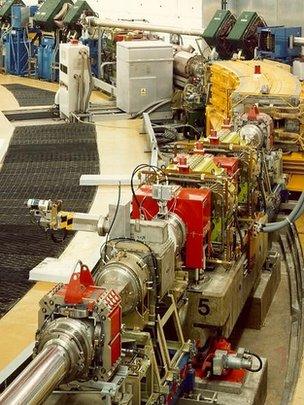Ministers fund science 'pet projects', says expert
- Published

Chancellor George Osborne has made a string of research funding announcements
The chair of the Lords science select committee has urged ministers to stop funding "pet projects".
Lord Krebs told BBC News that the current approach to science funding has been "ad hoc".
His comments come as his select committee publishes a report, external highlighting problems in funding research labs.
It calls for a long-term strategy for investing in new labs and equipment.
In 2010, the chancellor reduced the money for the construction of laboratories and the purchase of scientific equipment by almost a half, cutting the so called capital budget by £1.6bn.
Since then, George Osborne, and the Science Minister David Willetts, have been gradually restoring the shortfall left by the 2010 cut.
The investments though have been directed towards specific projects that the ministers, with advice from the scientific community, have deemed to be in the national interest.
These include investments of hundreds of millions of pounds for a graphene research centre, high performance computing and the upgrading of the UK's space agency.
Lord Krebs said that the replacement of capital funding almost to what it was in 2010 was welcome, but that the ad hoc approach to funding should now make way for a more considered approach by government.
Coherent strategy
"Pet projects have been supported rather than having a coherent long-term strategy for investment in the infrastructure of science," he told BBC News.
"Countries like Germany, Japan, China the United States are investing really heavily in state-of-the-art facilities. We are going to need to have that too if our scientists are going to deliver science we need for the future of this country."
There is an acknowledgement in the report that science has done relatively better than other areas of government expenditure during the coalition's time in power.
Money for staff costs, the so-called resource budget - although frozen was ring-fenced for five years by the chancellor in his 2010 Autumn Statement. And in June this year, Mr Osborne also announced an inflation-protected, capital-funding pot of £1.1bn to run up to 2020, which has given researchers some much needed clarity and stability.

ISIS: A shiny new facility but not the funds to maximise its use
The Lords select committee report has called for joined up thinking on how that money is allocated.
The peers want the civil servant with responsibility for science spending, Sir John O'Reilly, to bring together the research funders, industry and other key organisations that make large investments in laboratories and equipment, such as the Wellcome Trust, and work out what the national priorities should be and then to draw up a coherent strategy.
John Pethica, vice-president of the Royal Society, agrees with the select committee that investment in scientific infrastructure does need to be stable and long term.
"It must also be coupled with sufficient recurrent operational resources to derive the best return on capital investment," he said.
Dr Sarah Main, who is the director of the Campaign for Science and Engineering, told BBC News that the hitherto "lumpy" nature of capital funding had made it difficult for everyone to plan ahead.
"Representatives of multinational companies have told us that a long-term investment framework for science would help them make the case to their global headquarters for locating or remaining in the UK," she told BBC News.
"Indeed, we are now presented with an opportunity to shape our science facilities to match our vision of the UK as a thriving scientific nation."
Funding mismatch
The Lords select committee also found what it described as a "damaging disconnect" between resource and capital funding.
The peers found instances where the government has spent money on expensive equipment - such as the so-called "super microscope" at the ISIS laboratory in Oxfordshire, which cost £50m pounds to build, and which has recently doubled in size through a government-funded £145m investment.
The Lords inquiry found that not enough money had been set aside for running costs and for technical staff to ensure the upkeep and maintenance of the ISIS facility.
Consequently, the report says, it was only being used to two-thirds of its potential, resulting in "hundreds of potential experiments not happening, industrial projects losing out and a missed opportunity for UK research".
According to Dr Main, in order to get the most out of investments in equipment, there needs to be matching increases in the resource budget.
"We would like the government to set an upward trajectory for its science budget so that our new capital equipment can be used efficiently," she added.
The science resource budget, though, is under tremendous pressure.
Although it has been frozen and ring-fenced, it has been and will continue to be eroded by inflation and exchange rates.
It is also feared that squeezed government departments are about to raid the ring-fenced money to cover the costs of some of their science-related activities.
The research community feels squeezed. Many high-quality research proposals are now going un-funded, and fewer research positions are being funded. But no one dares complain for fear of offending the chancellor who, they have been told by Mr Willetts, has been extremely generous under the circumstances.
The money given to science by Mr Osborne is to be distributed to specific research areas by the end of the year and there are worries of a black hole in funding.
Most leaders in the research community are anticipating a continuing squeeze with some predicting worsening outcomes as the science budget is spread more thinly, according to Dr Main.
"If the chancellor is intent on 'winning the global race' and 'making the UK the best place in the world to do science', he will need to support that effort with the vision, determination and the funds to boost our position in the global premier league," she told BBC News.
- Published26 June 2013
- Published5 June 2013
- Published6 September 2012
- Published29 November 2011
- Published20 October 2010